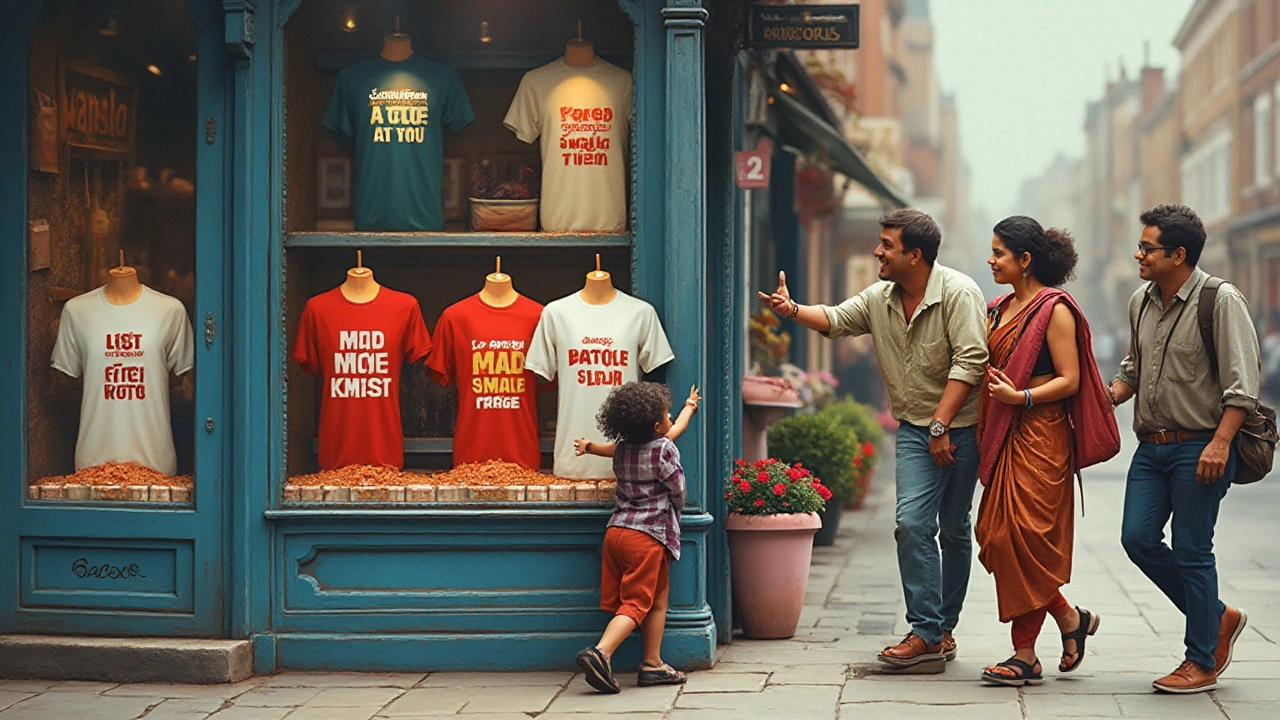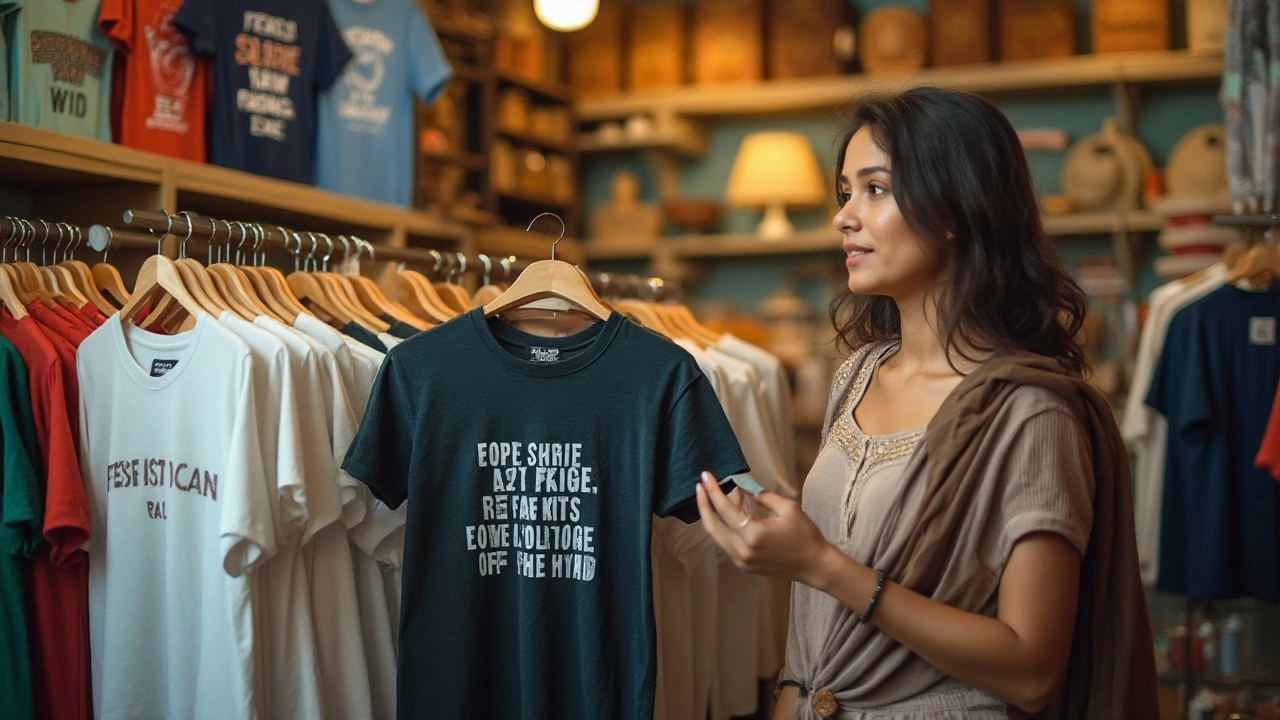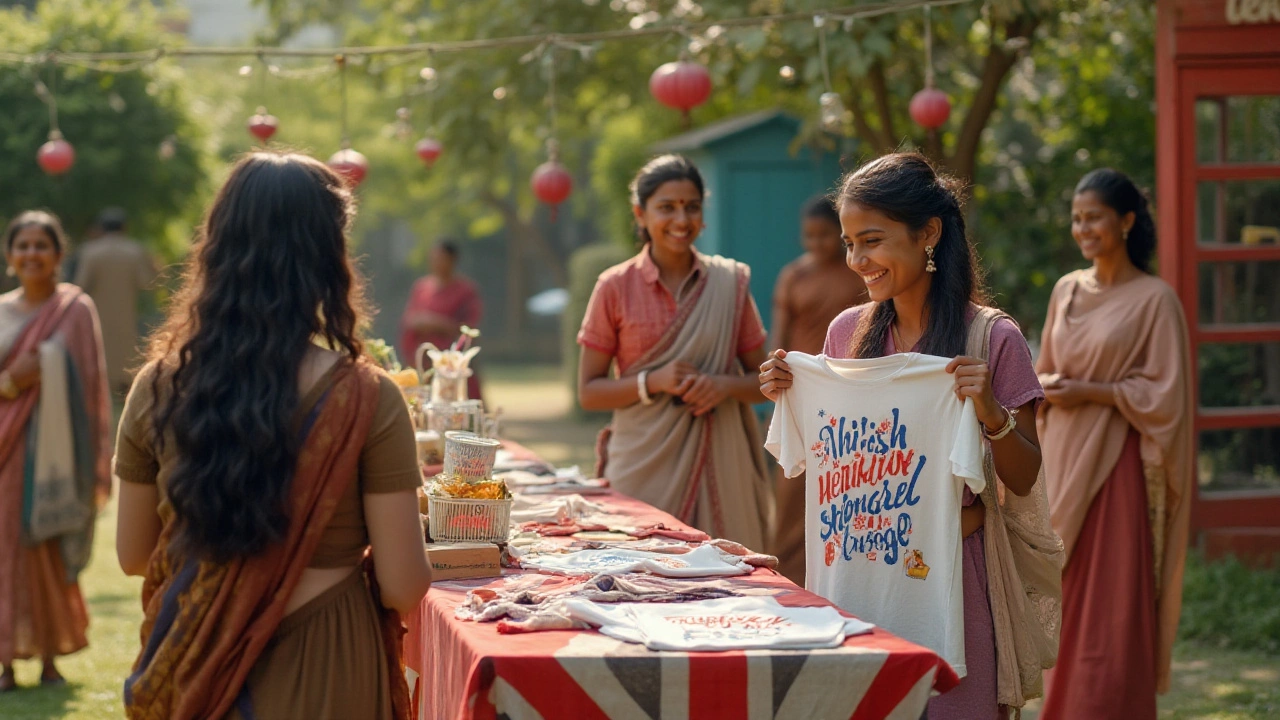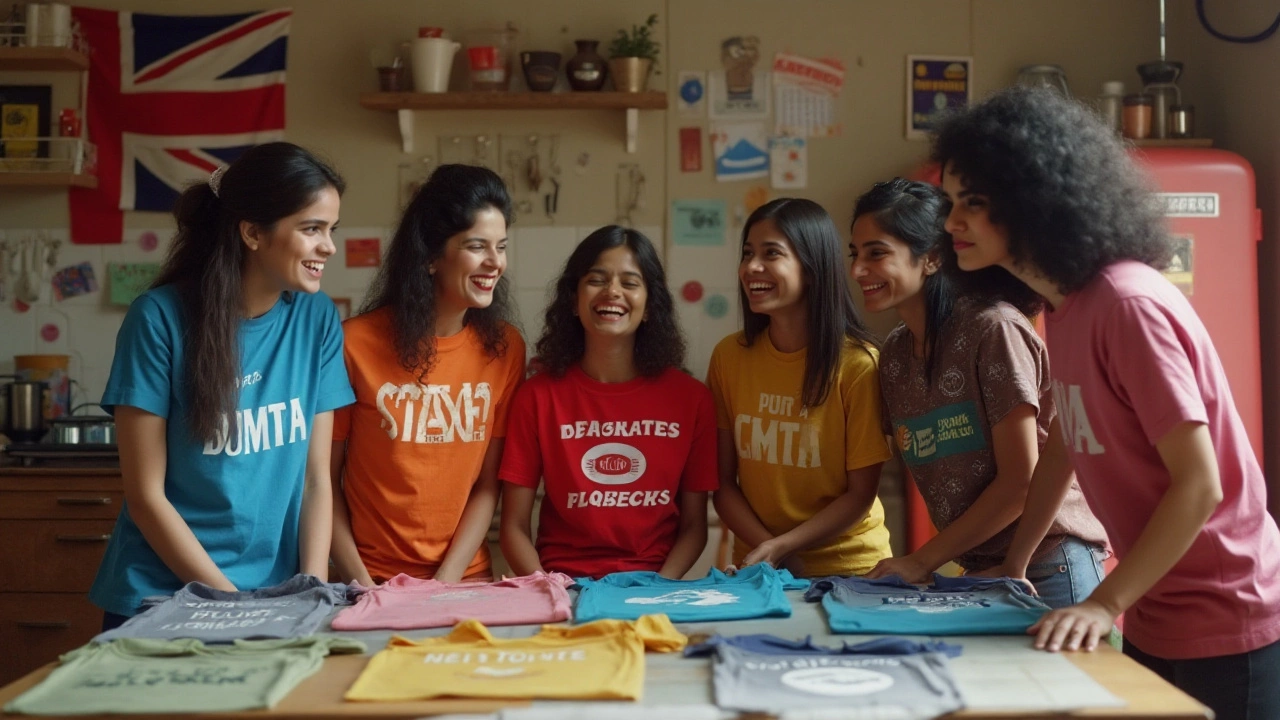If you've ever traveled across the pond or engaged with British media, you might have noticed the unique twists and turns of UK English. Among the quirky words and charming idioms, one might wonder how everyday items get their names. It's intriguing how something as simple as a fridge can tell a rich story about culture and language.
In the UK, a 'fridge' remains just that—a fridge. While it might not seem groundbreaking, the simplicity of the term is a nod to the way language can be both practical and whimsical. However, the broader conversation around British slang opens the doors to delightful discoveries.
In this exploration, we’ll dive into the terms that have found their way onto t-shirts, bringing humor and a dash of culture onto fabric. From witty expressions to abbreviated words, these elements reflect not just what people say, but how they think and live.
- The British Term for Fridge
- Slang and Language Evolution
- T-Shirts and British Slang
- Cultural Context in Language
The British Term for Fridge
The term 'fridge' is pretty universal, not just in the realms of the Queen's English, but around the world. However, when delving into the nuances of British slang, it’s crucial to note that the UK often embraces a straightforward approach to terminology, especially concerning appliances. This delightful device that keeps our milk cold and our veggies crisp is commonly referred to as a 'fridge' in the UK, just like in many other English-speaking countries. However, what makes the British take on language so engaging is the broader context within which these words live and breathe. The British vernacular is peppered with whimsical rhymes, historical references, and cultural significance that go beyond just keeping up with the Joneses.
Interestingly, the language surrounding the 'fridge' has evolved in a fascinating manner. While 'fridge' remains steadfast in usage, the slang applied to other parts of the household can tickle the fancy of even the most seasoned linguists. For instance, the kitchen isn't just the kitchen. In more formal or traditional circles, it might be referred to as the 'scullery' or 'galley', harkening back to older times with a touch of nostalgia. These terms, though not as widely used today, reflect an intriguing part of British history where language evolved alongside the society it served.
It's within this rich tapestry of language that the 'fridge', simple in its designation, blends into the narrative. This is crucial for those designing t-shirts that capture the essence of British English and culture. The interplay of humor, cultural identity, and practicality creates a unique opportunity for creativity. As a case in point, a t-shirt that playfully captions "Closed the fridge? Me biscuits are melting" juxtaposes the everyday with the British love for humor and food culture. Such work highlights the intersection between language, culture, and even clothing.
"The English language is a work in progress. Have fun with it." – Jonathan Culver
Statistics often show that household appliances have treasure troves of terminology linked to them, with variations moving from region to region within the UK. A humorous list might include pet names like 'chilly-bins' used in whimsy rather than convention. Yet, it's the steadfastness of 'fridge' that is reassuring. This exemplifies an established language underpinning both modern and traditional British households. Thus, while slang introduces new words or alters meanings, the fridge, by any language, retains its role—silent, yet indispensable.

Slang and Language Evolution
Language is a living entity, constantly evolving and reflecting the cultural waves of the time. In Britain, the playful nature of British slang offers a great glimpse into this evolution—how new expressions are born, mutate, and sometimes even fade into obscurity. The term 'fridge,' short for refrigerator, is a classic example of how words adapt over time for ease, convenience, and perhaps a dash of whimsy. Interestingly, while terms may seem stagnant, they often carry vibrant histories and unforeseen transformation journeys.
It is fascinating to note how linguistic trends can rise from unexpected origins. For instance, the term 'fridge,' while universally recognized, has ties to a complex history of domestication and industrial revolution. As English language evolved, many appliance-related terms emerged from trade names, much like 'Hoover' becoming synonymous with vacuum cleaners or 'Jacuzzi' with hot tubs. The way we adopt and transform such terms showcases the depth of language adaptation.
Modern advances in technology and communication often contribute to the rapid change and adoption of new slang. The Internet boom, for instance, introduced so many new words to the lexicon, sometimes bypassing traditional linguistic gatekeepers. In Britain, the adaptation of language reflects not only technology but also social rebellions, political shifts, and the never-ending infusion of dynamic cultural influences.
David Crystal, a renowned British linguist, once said, "Language changes because the needs of its speakers change." This encapsulates how language must stay relevant to survive, constantly adjusting to the zeitgeist of its time. British slang exemplifies this perfectly, managing to stay fresh and meaningful while ticking along with the steady background of an ever-evolving society.
The realm of T-Shirts serves as not just a fashion trend but a cultural canvas where these linguistic shifts flourish and become normalized. Catchphrases that originated within specific communities can quickly branch out, gaining popularity when showcased on apparel. British humor, wit, and irony—the very soul of many t-shirt designs—draw heavily from the linguistic pool, capturing the imagination and affection of the masses.
Even so, the use of slang on clothing poses intriguing questions about usability and comprehension across different audiences. In trying to be contemporary and edgy, designers walk the fine line between offensiveness and creativity. What appeals to a core demographic might bemuse others, thus adding another layer of engagement and interaction. And this is precisely what makes the relationship between language, culture, and fashion so enthralling—a realm where boundaries blur in vibrant displays of personal and collective expression.

T-Shirts and British Slang
The vibrant world of t-shirts is often more than just fabric and dye; it's a canvas for cultural expression and a snapshot of societal trends. In the UK, t-shirts have become a popular medium for showcasing the nation's unique blend of humor and language through British slang. The simplicity and accessibility of a t-shirt make it an ideal platform to celebrate or gently poke fun at the quirky language that has defined British identity for generations. It's fascinating how a mere garment can serve as a conversation starter or a cultural touchstone. The playful phrases and idioms splashed across t-shirts often mirror the evolving vernacular of the UK, channeling both historical linguistic roots and contemporary influences.
Imagine walking through the bustling streets of London or the quaint pathways of an English village. You're likely to come across a sea of t-shirts emblazoned with phrases such as 'Keep Calm and Carry On,' a nod to the British spirit of resilience, or 'Mind the Gap' taken straight from the Underground announcements. These phrases, now iconic, represent not just the words themselves, but the emotions and memories they conjure. They have become symbols of British life, providing a sense of belonging and shared experience. A t-shirt can transform a simple phrase into a trendsetting message, embraced by people beyond its origin, resonating with anyone who appreciates British culture or has shared in its humor.
It's no surprise that t-shirt designers draw inspiration from this rich linguistic tapestry, often interlinking cultural references and the day's most popular slang. A t-shirt might feature 'Blimey!' splashed across it, evoking a mix of surprise and amusement. Or perhaps 'Brolly,' meaning umbrella, charmingly depicts the Brit's eternal battle with weather. Crafting a design that captures the essence of such expressions requires an acute understanding of their nuance, humor, and context. In doing so, designers tap into a timeless appeal, crafting apparel that is as much a fashion statement as it is a cultural artifact.
Let’s not forget the intriguing emergence of t-shirts bearing slang that speaks to niche communities within the UK. Consider regional slang, where a 'stottie' (a type of bread from Newcastle) or 'mardy' (meaning grumpy, from the East Midlands) finds its place on a t-shirt. These designs not only celebrate local identity but also invite those outside the community to share in the uniqueness of regional British culture. It’s a testament to how language, even when printed on a t-shirt, transcends mere communication, moving into the realms of identity and expression. As demand for these creatively designed shirts grows, they become integral to the dialogue around British English, capturing the evolving nature of language in a way that remains relatable.
"Fashion is not something that exists in dresses only. Fashion is in the sky, in the street; fashion has to do with ideas, the way we live, what is happening." - Coco Chanel's notion rings true when considering how t-shirts serve as vessels of British slang, encapsulating elements of daily life within their designs.
The art of the British slang t-shirt has indeed opened up a market that is as diverse as the slang itself. For many, a cleverly crafted t-shirt is more than just comfort wear; it's a badge of honor, a piece of British heritage worth wearing proudly. T-shirt lines that focus on slang allow for personalization and a touch of humor, capturing the unique essence of British culture. The success of these lines propels them into an ever-expanding market that not only celebrates tradition but also embraces linguistic evolution. For those who adore the nuances of British English, these t-shirts are more than just clothing; they are an exciting and stylish gateway into a vibrant, living language.

Cultural Context in Language
The way we use language is inextricably tied to our cultural environment. In the UK, for instance, the lexicon surrounding daily life is peppered with colloquial terms that carry the weight of history and a sense of identity. The word fridge, although straightforward, is part of a broader linguistic canvas where each term or phrase holds echoes of the past. Language is not just a tool for communication; it's a vessel for tradition and societal norms, often subtly reflecting the values and attitudes of the people who use it. When a term like fridge is appropriated for humor or emphasis on a t-shirt, it serves as a playful nod to that cultural heritage, transforming an ordinary object into a canvas for self-expression.
To see this in action, consider the British fondness for abbreviations and portmanteaux, which are forms of linguistic creativity that have found their way into everyday vernacular. In settings where space efficiency and ingenuity are celebrated traits, it's no surprise that language would similarly be compact and clever. Words like 'loo' for bathroom or 'brolly' for umbrella not only simplify the spoken word but also forge a shared cultural identity that outsiders find both charming and bewildering. Notable linguist David Crystal noted,
"Language is the chief means by which cultural backgrounds are handed on. It is also the principal means by which we explore our identity."Applying these principles to apparel, t-shirt designs that feature such terms allow speakers to wear their language—literally.
Moreover, if you delve deeper into the history of British slang, you'll discover influences from various waves of immigrants and the evolution of regional dialects over centuries. This melting pot of influences creates a dynamic language environment where certain words and phrases can assume meanings that extend far beyond their original definitions. British youth culture, in particular, has been a fertile ground for the generation and spread of new slang, much of which gets absorbed into the textiles and prints you see in fashion today. It helps tell a story not only about current trends but also casts a light on the social dynamics at play, be it the punk movement of the 1970s or the more recent streetwear craze.
In the arena of pop culture, British slang has long been celebrated for its cheek and charm in movies, literature, and music. It captivates non-natives who find in it a gateway to understanding the cultural DNA of the UK. The use of British terms on global fashion platforms reinforces the idea that the UK's linguistic quirks have an international appeal. When you sport a t-shirt emblazoned with a witty British expression, you're not just making a style choice; you're engaging in a subtle form of cultural diplomacy. Fashion has the power to spark conversations and break down barriers, and language is its silent ambassador.
